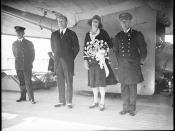Some of the American colonies were established by various religious
sects from England that either disagreed with the Church of England or fled
to the Americas facing persecution by the Anglican Church. Overtime,
religious groups in the colonies obtained a charter from the King of
England and became formally recognized as colonies. The colonies were
shaped according to the beliefs of the religious group (if the colony was
established by a religious sect). Religious freedom in the Northern
colonies, except Rhode Island, allowed no religious freedom while the
southern and the middle colonies were a bit more yielding to different
ideas.
The northern colonies' dominant religion was Puritanism. Puritans
were a group of English men who opposed with the way the Church of England
was run. Puritan extremists called for the Church of England to be
purified. Facing persecution, they fled to the Americas where they set up
a government that incorporated Puritan beliefs.
The Puritans set up a state
church, very much like the Church of England, that was tax supported.
Everyone, regardless whether they were a Puritan or not, was forced to pay
taxes. The Puritans were also oppressive against nonbelievers of the faith
for i.e. Roger Williams who was banished from the colony because he
publicly questioned the Puritan government's involvement in religious
matters. Roger Williams later went on to set up the Rhode Island colony.
Another example of religious in-toleration of the Puritans is the case of
Anne Hutchinson, who claimed that a holy life was not a sign of salvation
and the truly saved didn't have to bother with the laws of man or god. In
response to her claim, the government tried her on the charge of heresy and
banished her from the colony.
The Middle colonies were the most tolerant of all...



Typos & Grammar
Please note that there are several spelling and grammar mistakes in my essay...
:)
0 out of 0 people found this comment useful.